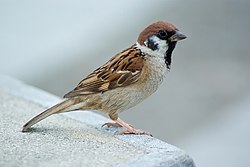Four Pests Campaign
From Wikipedia, the free encyclopedia

"Everyone come and fight sparrows" —
Propaganda poster showing children killing sparrows using a sling shot
The
Great sparrow campaign (
Chinese:
打麻雀运动;
pinyin:
Dǎ Máquè Yùndòng) also known as the
Kill a sparrow campaign (
Chinese:
消灭麻雀运动;
pinyin:
Xiāomiè Máquè Yùndòng), and officially, the
Four Pests campaign was one of the first actions taken in the
Great Leap Forward from 1958 to 1962. The four pests to be eliminated were
rats,
flies,
mosquitoes, and
sparrows.
Campaign

sparrows were killed by the peasants,
causing a major
ecological imbalance in the environment
The campaign was initiated by
Mao Zedong, the first
President of the People's Republic of China. Sparrows – mainly the
Eurasian Tree Sparrow – were included on the list because they ate
grain seeds, causing disruption to agriculture. It was decided that all the peasants in
China should bang pots and pans and run around to make the sparrows fly away in fear. Sparrow nests were torn down, eggs were broken, and nestlings were killed.
Initially, the campaign did improve the harvest. By April 1960 the
National Academy of Science found that sparrows ate insects more than seeds. Mao declared "forget it", and ordered the end of the campaign against sparrows.
By this time, however, it was too late. With no sparrows to eat them,
locust populations ballooned, swarming the country and compounding the problems already caused by the
Great Leap Forward and adverse weather conditions, leading to the
Great Chinese Famine in which around 30 million people died of starvation.
Revived campaign
On June 19, 1998, a poster was spotted at
Southwest Agricultural University in
Chongqing, "Get rid of the Four Pests". Ninety-five percent of households were ordered to get rid of four pests. This time,
cockroaches were substituted for sparrows.
A similar campaign was spotted in the spring of 1998 in
Beijing. This time, people did not respond to either of these campaign style approaches, as they were already fond of killing the said four pests, most especially cockroaches.



Um momento emblemático da alta modernidade (desculpem) que também serve para provar que a afirmação segundo a qual a História serve para aprendermos com os nossos erros é uma palermice.
ResponderEliminartoda a razão, Eduardo, ou de como as maiusculas são teclas baixas :D, meu lindo :D
ResponderEliminara quem possa interessar:
ResponderEliminaro comentário anterior não é meu.